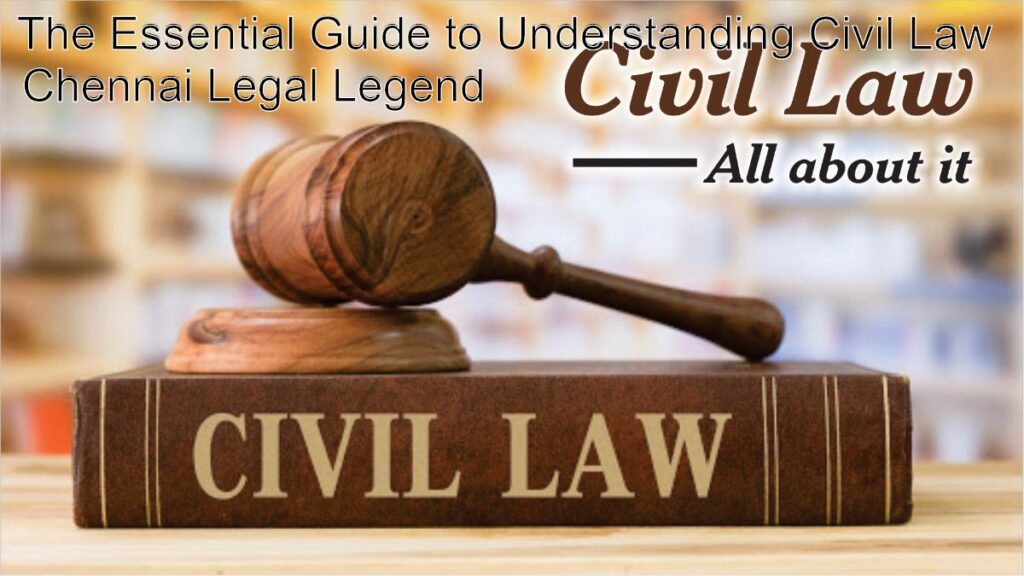The Essential Guide to Understanding Civil Law: Civil law, the governing body of non-criminal disputes, can often feel intimidating for those unfamiliar with its intricacies. However, fret not! This guide, crafted specifically for Chennai residents, aims to demystify civil law and empower you with essential knowledge. We’ll delve into its core concepts, explore the role it plays in your daily life, and even introduce you to the legendary figures who have shaped Chennai’s legal landscape.
The Essential Guide to Understanding Civil Law: Chennai Legal Legend
What is Civil Law?
In essence, The Essential Guide to Understanding Civil Law is that of civil law concerns disagreements between individuals or entities. Unlike criminal law, which deals with offenses against the state, civil law focuses on resolving conflicts like property disputes, contract breaches, and personal injuries. The primary objective is to achieve a fair and just outcome for both parties involved.
The Framework of Civil Law
Civil law proceedings adhere to a well-defined structure. Typically, the aggrieved party (plaintiff) initiates the process by filing a lawsuit outlining their claims against the other party (defendant). This lawsuit serves as the foundation for the case, detailing the nature of the dispute and the desired resolution. Subsequently, the defendant has an opportunity to respond by presenting their defense.
Following the initial stages, the court plays a crucial role. Evidence is presented by both sides, which may include witness testimonies, documents, and expert opinions. The judge then carefully evaluates the evidence and arguments before delivering a verdict. This verdict dictates the final outcome, which could involve compensation for damages, enforcement of a contract, or a specific course of action.
Civil Law in Your Daily Life
Civil law plays a surprisingly significant role in our everyday lives. Here are some common scenarios where it might come into play:
- Rental Disputes: If a landlord fails to maintain the property or withholds your security deposit without justification, civil law provides a path to seek redress.
- Debt Collection: If someone owes you money and refuses to repay it, civil law offers legal avenues to recover your dues.
- Consumer Complaints: If you purchase a faulty product or receive a service that falls short of expectations, civil law empowers you to seek compensation from the seller.
- Contract Breaches: When a party fails to fulfill their obligations under a contract, civil law provides a framework for resolving the issue and potentially awarding damages.
- Traffic Accidents: In the unfortunate event of a car accident, civil law helps determine fault and establish liability for any resulting injuries or property damage.
The Chennai Legal Legends
Chennai boasts a rich legal history, and several prominent figures have left an indelible mark on the city’s civil law landscape. Here are just a few examples:
- C.P. Ramaswami Iyer: Revered as the “Father of the Indian Constitution,” Iyer played a pivotal role in drafting the document and was instrumental in shaping the nation’s legal framework.
- Alladi Krishnaswami Iyer: A renowned jurist and freedom fighter, Iyer actively championed social justice and human rights, leaving a lasting impact on civil law principles in India.
- M.C. Setalvad: A legal luminary known for his exceptional courtroom skills, Setalvad argued several landmark cases that continue to influence civil law interpretations.
Understanding Legal Terminology
Civil law can be dense with specific terminology. Here’s a quick breakdown of some frequently encountered terms:
- Plaintiff: The party initiating the lawsuit.
- Defendant: The party against whom the lawsuit is filed.
- Lawsuit: A formal document outlining the claims and desired outcome of the plaintiff.
- Verdict: The final decision of the court in a civil case.
- Damages: Monetary compensation awarded to the plaintiff for losses incurred.
- Injunction: A court order directing a party to take a specific action or refrain from doing something.
FAQs: Your Civil Law Concerns Addressed
- Do I need a lawyer for every civil case?
While it’s not mandatory to have a lawyer for every civil case, seeking legal representation is often recommended. Lawyers possess a deep understanding of civil law procedures and can effectively advocate for your interests.
- How long does a civil case typically last?
The duration of a civil case varies greatly depending on the complexity of the dispute and the court’s workload. Simple cases might be resolved within a few months, while intricate ones can last for years.
- What are the costs associated with a civil lawsuit?
There can be a range of associated costs in a civil lawsuit, including court fees, lawyer fees, and expert witness fees.
- What are alternative dispute resolution (ADR) options?
Instead of going to court, consider exploring alternative dispute resolution methods like mediation or arbitration. These processes can be quicker and less expensive than traditional litigation.
In Conclusion
The Essential Guide to Understanding Civil Law empowers you to navigate legal issues with greater confidence.
Read More
- Senior Lawyers for Constitution Matters
- Civil Litigation Help
- Civil Lawyers in Chennai https://advocates.org.in/civil-lawyers-in-chennai/
- Real Estate Lawyers in Chennai https://advocates.org.in/real-estate-lawyers-in-chennai/
- Ministry of Law and Justice of India https://lawmin.gov.in/

